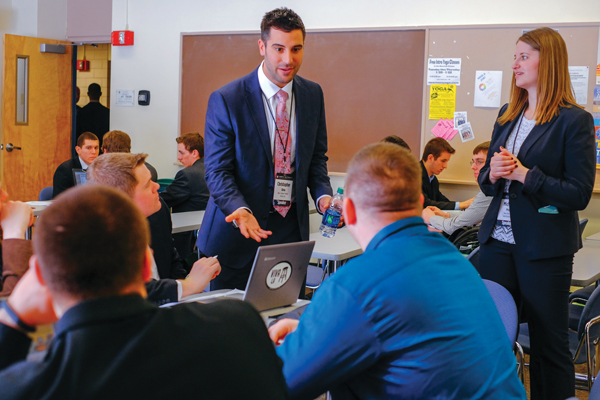In the Mark H. McCormack Department of Sport Management at the University of Massachusetts and at the Georgia Southern University Department of Sport Management, both of us realize the importance of sport management students supplementing their in-class experience with experiential learning opportunities outside of the classroom. Both of us also serve as our department’s directors of internships and we’ve heard from hundreds of hiring managers that the experiential learning component of one’s sport management education can make the difference with entry-level employment opportunities.
In 2004, we collaborated with GSU athletic department administrators to create a student-run sport marketing agency called Grand Slam Marketing. With the help of an $8,000 grant from the baseball program (don’t be afraid to ask, the baseball team and athletic department were huge beneficiaries of Grand Slam Marketing), our students were able to purchase equipment and GSM uniforms for a group of 16 students who were responsible for all of the between-innings, on-field entertainment during GSU home baseball games.
Also, with the assistance of the director of the GSU University Store, GSM set up a retail/merchandise store on the concourse of the new $3.5 million baseball stadium that generated approximately $22,000 in sales of licensed hats, sweatshirts, coffee mugs, keychains, foam fingers and much, much more. Items for sale were selected based on market research conducted by GSM members surveying 660 GSU students via laptops at the school’s fitness center.
During each home baseball game at GSU, students would walk through the stadium seating sections showing off items that were for sale at the concourse store and would sell raffle tickets to fans for the chance to win golf clubs and a bag, free tuition for a semester, a $1,000 Best Buy gift card, $1,000 savings bond and more. Furthermore, GSM members would recruit both young and old fans to participate in the between-innings on-field entertainment ranging from sumo wrestling to father-son home-run hitting contest to a longest drive contest (with wiffle golf balls). All of these entertainment activities were sponsored by local banks, golf parks, etc. Finally, we both shared the responsibilities of teaching an experiential sales class associated with GSM from 2002 to 2008 that resulted in $127,000 in ticket revenue for the GSU athletic department.
Upon my arrival at UMass in 2008, I was recruited by the student club to help them develop some of the things we were doing at GSU. The McCormack Student Leaders Club now runs four premier events generating $43,000 in revenue in 2015. The events run by the club consist of:
■ An elite junior hockey tournament held at the university’s ice arena (Mullins Center) each October.
■ A 22-team high school basketball showcase held each December in the Curry Hicks Cage (former home to Julius Erving and John Calipari).
■ The McCormack Future Leaders Conference held in the Isenberg School of Management each February.
■ A high school golf tournament held each April at two local country clubs.
Annual profits generated from these four events are used each year to send four students on a three-day, all-expense-paid networking trip to the winter baseball meetings (beginning in 2016) and 11 students on a three-day, all-expense-paid networking trip to New York to meet with alums at Madison Square Garden, IMG, NBC Sports and other destinations.
 |
Chris Silvia and Michelle Price speak at the 2016 McCormack Future Leaders Conference.
Photo: COURTESY OF UMASS AMHERST
|
For both GSM and the McCormack Student Leaders Club, both groups of students were able to gain valuable experience through collaborating with some of the following stakeholders: University officials, directors of campus facilities, school media, national media (Atlanta Journal-Constitution, Boston Globe, ESPN Boston, etc.), Massachusetts Interscholastic Athletic Association, local/national corporate partners including Powerade, Dick’s Sporting Goods, Anschutz Entertainment Group, school catering services, athletic department officials, high school athletic directors/coaches and all varieties of fans/consumers. For example, the McCormack subcommittee responsible for managing the high school golf tournament reached out to McCormack alum and PGA Tour Commissioner Jay Monahan, who connected the subcommittee with corporate partners and apparel/equipment vendors interested in working with a grassroots golf tournament. Other examples include the McCormack subcommittee responsible for managing the Future Leaders Conference collaborated with McCormack alums Michelle Price of the New York Mets and Chris Silvia of the Kraft Sports Group.
These opportunities at both schools provided fantastic hands-on learning and industry networking opportunities as well as résumé/cover letter development, and what I think is the most important point — incredible talking points for job/internship interviews that serve as a strong point of differentiation from other applicants by demonstrating their strong commitment to working in the sport industry.
We understand that every school has different levels of resources available to sport management students, and so the research and planning stages of these endeavors was quite lengthy. We’d also be remiss if we did not acknowledge that there were certainly initial levels of skepticism from many of the stakeholders previously mentioned. Not all university administrators or athletic department administrators are willing to sign off on what’s basically an unproven entity.
Our advice to all those looking to pursue this type of opportunity is to arrive to each and every meeting with these stakeholders with a very well-thought-out proposal that can be discussed and left behind for further review. In both cases, we believe it made the difference in both projects being approved.
Tony Lachowetz (anthonyl@isenberg.umass.edu) is senior lecturer and internship director in the Mark H. McCormack Department of Sport Management in the Isenberg School of Management at the University of Massachusetts Amherst. Sam Todd (sytodd@georgiasouthern.edu) is a professor of sport management at Georgia Southern University.





